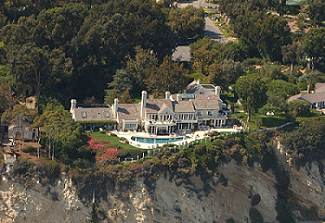By: Chris Warren.
Call it pride, misjudgement, or just plain looney, I can’t figure out why a certain element of people will dramatically claim they were wronged and in the process of trying to make everything right, they become a party to making it worse.
Foolishly letting themselves become hapless ringmasters of their own very public circus, they realize only after the tent collapses that if they had just laid low and kept their mouth shut, the embarrassment and damage would have been mitigated if not eliminated outright. Assuming, of course, they had a legitimate gripe in the first place. In many of these situations, the only “problem” is the one the self-appointed victim created.
For today’s cautionary tale of looney, I present entertainer Barbra Streisand, who went off the hook when a photographer incidentally included her house in an aerial photo. The photo was buried in a collection of many thousands of pictures of California coastline geographic features publicly available on line. When Babs found out, she quickly lawyered up to have the photo purged from the internet. The lawsuit and ensuing media coverage resulted in exactly the opposite of what she was trying to achieve: The photo became a huge draw. Prior to Streisand’s childish meltdown, it had been viewed less than ten times, and that included web page hits from her own attorney. After the Hollywood paparazzi caught the scent of the lawsuit, the image pulled in over 420,000 views in less than a month and is to this day still widely copied and reposted.

This spectacle of incredibly poor foresight was the genesis of the Streisand Effect, a term coined to describe what happens when someone tries to erase something from the internet and the attempt epically backfires to spawn a high-profile storm of attention that, but for the effort to get rid of it, would have never occurred. The inaugural Streisand Effect incident was back in 2003…social media did not exist, the internet was still an emerging platform, and digital cameras were big dollar luxuries. Had Streisand stuck to opening her mouth only when singing, the aerial picture of her house would have been just another obscure web page with single-digit popularity. Not only did she ultimately lose her legal case (along with the ton of money spent on it), she became an eponym for the ages for more than just her singing talent.
The year 2003 is ancient history in internet time. Today, it would seem to be a common assumption that everyone has a greater awareness of the possibility that unwanted information is difficult to erase. It only takes a short trip to YouTube or any one of the hundreds of comedy websites to figure out that the assumption is totally wrong. There are infinite gigabytes of people doing things that they would probably not do if they knew it would end up on line. As if that were already over the top, there are still other more-guts-than-brains types who know full well their gags will live forever in cyberspace because they are are purposely uploaded by the participants themselves.
It’s one thing to be upset when something is released by others that was not intended for public consumption, it’s quite another to let the genie out of the bottle yourself. By doing so, one forfeits the right to complain about it later. Hardly a week goes by when an amazing act of dumbassery flashes across the net in mere moments, then realizing what they have done, the perpetrator makes a vain attempt to backpedal out of the mess, which serves only to make the mess bigger and more popular.
As Ms. Streisand’s now (in?)famous example teaches us, there are very few purely innocent victims of internet embarrassment. And of those who are, many bring further damage unto themselves by going on a fool’s errand to remove the offense. Much of the “humiliation” out there is manufactured by the humiliants…if that’s a real word.
Putting anything about yourself on the internet is a lot like getting a tattoo: It stays there forever so you better really, really make sure it’s what you want. Young people in particular lack this level of discretion. The internet hasn’t been around long enough to fully know what the extended effects of immortalizing adolescent misadventures will be, but there can’t possibly be any lasting benefit of a digitized half naked teenager holding a can of beer, especially a decade or two down the road when they have kids of their own.
A recent European Union court ruling that everyone has “the right to be forgotten” means google and other search engines are legally required to remove links upon request if the person to whom the link refers to does not want to be found on line. Those wishing to take advantage of this new right may want to consider that they risk being sucked in by the Streisand Effect. There is already a cottage industry of websites based outside the jurisdiction of the E.U. dedicated to exposing what google will not. You’ve been warned.
The idea of anyone running to their attorney over something as mundane as a distant, indistinct picture of their house seems quaint compared to what is easy to find on line these days. The trifecta of lack of sense, lower standards of acceptable behavior, and a digital camera in everyone’s pocket has busted the door open to all kinds of crazy, a lot of which the involved parties are actually proud of…for now. On the cosmically small chance Babs Streisand reads Twenty First Summer and doesn’t like this article or the photo that goes with it, I’m betting this time she will keep her lawyers out of it and quietly move along.
If in my own moment of crazy I am memorialized on the Web, I promise not to say anything to anyone. I’ll just fade into the background and hope the whole ugly deal is lost in a sea of other people’s foolishness.